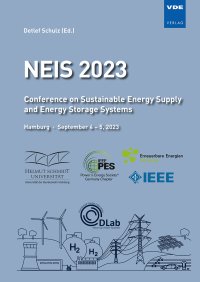Facing the energy crisis: implementing short-term measures to reduce costs and emissions at industrial manufacturing sites
Conference: NEIS 2023 - Conference on Sustainable Energy Supply and Energy Storage Systems
09/04/2023 at Hamburg, Germany
Proceedings: NEIS 2023
Pages: 6Language: englishTyp: PDF
Authors:
van Ouwerkerk, Jonas; Brucksch, Jonas; Bussar, Christian (Institute for Power Electronics and Electrical Drives (ISEA), RWTH Aachen University, Aachen, Germany & Institute for Power Generation and Storage Systems (PGS), RWTH Aachen University, Aachen, Germany & Juelich Aachen Research Alliance, JARA-Energy, Germany)
Sauer, Dirk Uwe (Institute for Power Electronics and Electrical Drives (ISEA), RWTH Aachen University, Aachen, Germany & Institute for Power Generation and Storage Systems (PGS), RWTH Aachen University, Aachen, Germany & Juelich Aachen Research Alliance, JARA-Energy, Germany & Forschungszentrum Jülich GmbH, Institute of Energy and Climate Research Helmholtz-Institute Münster: Ionics in Energy Storage (IEK-12)), Jülich, Germany)
Abstract:
Wholesale prices for electricity in Europe have substantially increased during the energy crisis in 2022. As an answer to the crisis, many heavy industry companies are considering diversifying their energy consumption by accessing renewable energy sources. In addition, battery storage can provide flexibility and increase the amount of self-consumed electricity from renewable generation. Moreover, implementing battery storage systems offers the potential for additional cost savings when utilizing services like peak shaving. One industry application that is particularly affected by the energy crisis is glassworks with high demands for natural gas and electricity. Therefore, in a case study, we investigate possible measures to reduce the costs of an existing glass melting and manufacturing site. This requires a detailed modeling of the energy system. For modeling, we extend the existing FOCUS framework for energy system optimization. The results of the optimization show that a power purchase agreement for a nearby solar PV system of 15 MWp reduces overall annual system costs by 5.7%. When accessing additional potential solar PV capacity and a wind turbine of 6 MW the savings reach a maximum of 9.3%. Future evaluation will aim at the full decarbonization of the site.


